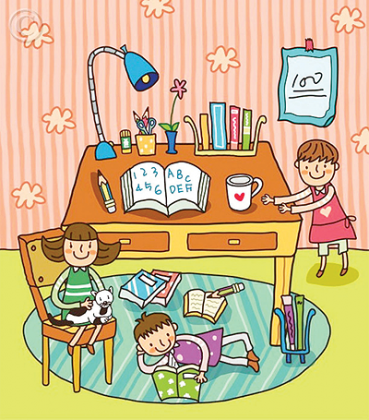This post is a summary of the book The Book You Wish Your Parents Had Read by Philippa Perry.
Part one: Your Parent Legacy
Outside of your awareness, your kid behaviour is threatening to trigger your own past feelings of despair, of longing, of loneliness, jealousy or neediness.

When you feel or react in a certain way with your child, stop and reflect on why you react or feels this feeling. Ex: When you want your child go sleep to make you rest, think on when you was a child like him and how you would feel if your parents react in this way.
Praise effort, describe what you see and feel and encourage your child without judging.
Say “I liked how hard you were concentrating when you did those sums” rather than “You’re great at maths”.
It is not only how we respond to our children that shapes their personality traits and character but also what they witness and feel in their environment.
Part two: Your Child’s Environment

Arguing: In any conflict, there is:
- the context: what you arguing about,
- how you feel about the conflict,
- how the other person feels about it,
- the process, which is how you go about solving the pro blem.
Use “I” statements rather “you” statements: describe how you feel.
It is about understanding and compromise, not about winning.
Conflict puts children on alert, threatens their sense of security and leaves them less able to be open and curious.
Part three: Feelings
Listen to your child’s feelings and accept them, tell him that you understand and if it is a bad feeling it will pass with a little of time. Be a container for their emotions, don’t repress neither overreact.

When the warning petrol lamp turns on, add fuel, don’t remove the warning bulb.
If you child don’t want to go school, don’t say “you are going and that’s that” but “you really hate the school right now, don’t you?”
Say “I feel sad”, “it looks as though you may be feeling sad” rather “I am sad” or “you are sad”.
The more we express ourselves about things, the less scary they become…
Learn to say sorry and admit when you are wrong, so your child will learn to do the same.
Validate your child feelings: “You really want to sit here don’t you?”. Acknowledge and talk about your child feelings with him. When we feel bad, we don’t need to be fixed. We want to be felt with rather than dealt with. We want someone else to understand how we feel so we do not feel lonely with that feeling.
You want to be the person your child can talk to. If you tell them they are being silly to complain when Granny made them a nice lentil stew, they may feel they can’t tell you when the creepy piano teacher puts his hand on their leg.
Never distract your child from his emotions.
Part four: Laying A Foundation
Create bonds by being always sincere with your emotions with your child.
Eating chocolate every day in the last third of the pregnancy will reduce risk of pre-eclampsia and the baby will smile more.
2 kinds of parents
- Facilitator: adapt to the child
- Regulator: routines and rules
4 attachment styles
- Secure attachment style: listen to your child needs
- Insecure/ambivalent attachment style: child has to scream to get attention
- Avoidant attachment style: child left to cry and no attention to him -> child will no more even try to get something. The child will see himself as a loner
- Dismissive attachment style: child not even ask and harmed. The child will see other people as a threat
Do not let your child cry or he will dissociate from his emotions. Make attention to your child feelings and emotions.
Part five: Conditions For Good Mental Health
Be physically and emotionally close to your child.
Be open and willing to learn from your children. Respect his point of view so he will respect others pow.
Allow yourself to be impacted by your children, listen to him and make him see you did. Let him influence you. Communication is two ways.
Exercice: breathe at the same rythme.
Include your child in most the tasks you do, avoid pushing them away because you have to send a message or answer to a call. Never never stay on your phone when you are with your child!!!
Explain you child what is going to happen next, treat them as a people.
The more positive energy and time you invest in your child at the start, the less of your energy you will need to invest further on: spend time with you child and he will be secured about your love so he will not need your attention every time.
Sleep
Your child should associate sleep with comfort, security and company, then they will feel good about going to bed. We get trouble with sleeping when we try to push them to sleep, so they associate it with loneliness and rejection.
All mammals sleep with their young. Don’t let your child cry during the night, it will cause stress.
Nudging sleep
Reduce comfort baseline little by little till you je child can sleep in his bed alone.
Let your child do by himself when he can do it. Help him when needed (and avoid rescuing if not necessary).
Playing
Never interrupt a child that is concentrating (even if he is playing).
Too much toys is not a good thing, they will be afraid to do the wrong choice and they will have more difficulty to concentrate on one thing.
Play with your child is a time to let him take the lead.
Start playing with your child and gradually back off when they start to be absorbed if you have stuff to do (your child is now comforted that you take care of him and will play without stress). Try to play with them as much as possible to not let them feel alone and even insecure about their relationship with you.
If they don’t find something to do say you are confident in them they will find something, don’t be the entertainment officer.
Younger children can learn more from older friends than they would by just mixing with their peers. And older children teach younger ones so they learn how to teach and how to be leaders.
Part six: Behaviour: All Behaviour Is Communication
Your child will ape your behaviour soon or later.
Behaviour is communication
Behaviour is purely communication – People, and especially children, act out in inappropriate, inconvenient ways because they haven’t found alternative, more effective, more convenient ways of expressing their feelings and needs. So instead of dividing our children up into good bits and bad bits, ask yourself “What is their behaviour ttrying to say?”.
Behind behaviour you will find the feelings. Once you discover the feeling behind any particular behaviour and empathize with it, then you can put the feeling into words, you will help a child use words to express themselves and they will have less need to act out on that feeling.
Winning and losing relations

In a relation with your child you dont need to be in a relation of winning or losing (humiliation), it can get entrenched as a dynamic and this damages relationships. If you act as though a large part of childcare is imposing your will over your children, the patterns of relating that your child will learn from that have the potential to be harmful. If a child learns such a limited choice of roles – “the doer” and “the done to”, or to put it another way, the dominant and the submissive, it considerably limits their potential as a person.
Try to understand your child feelings, help him to put them into words, propose solutions, choose a collaborative relation, brainstorm with your child to find the best solution.
Going with what is working in the present rather than what you fantasize may happen in the future
If what is working stop working, then implement a change, but make it one where everyone wins, or at least where there are no winners or losers.
The qualities we need to behave well
There are 4 skills we all need to develop, as parents, and teach to our children, in order to become socialized, to behave conveniently:
- Being able to tolerate frustration
- Flexibility
- Problem-solving skills
- The ability to see and feel things from other people’s point of view
Please and thank you
Don’t force your child to say “thank you” if they not understand the real meaning of gratitude. They really lear how to say “please” and “thank you” when gratitude and respect have been shown to them. They can then embody it. If you drill your child into saying these things, they may never learn to feel them.
If the child doesn’t feel yet the gratitude, we ca give thanks for the present ourselves so the giver doesn’t feel unappreciated.
Frustration for child

Interrupting a child or and adult in a middle of a complicated piece of work (which is playing for a child) would make him frustrated. So give a 10 minutes warning, then 5, then 3 etc..
When your feel that your child is frustrated or begin to be frustrated try to identify his difficulty and say it in a way that make sense for him, for example: “You are feeling frustrated because you don’t want to stop this fun game” (put frustration into words).
Try to always explain your plans and give warning to the child if it is not part of his routine or unexpected move.
When explanations are unhelpful
Sometimes we can say that our child behave in an incovenient way because he is tired, but sometimes it is not an accurate mirror of what he is feeling so he can feel misunderstood. Some other interpretation can be harmful for your child:
- They are doing that for attention. If your child really want to have attention put into words his behaviour/feelings and ask him to ask for attention instead behaving in that inconvenient way
- They are being manipulative
- They know just how to wind me up
- They have something wrong with them
How strict should a parent be?
The 3 main approches to trying to steer a child’s behaviour tend to be:
- Being strict
- Being lax
- Collaborating
Collaborating method should be the one to prioritize:

- Define the problem by defining yourself: I need your room to be tidy and I would like you to tidy it
- Find out the feelings behind the behaviour. The child may need help with this. For example, “Do you feel it’s unfair to have to tidy your room when your friend made the mess?” “Do you feel over-whelmed by the job and feel it will take forever to sort out?”
- Validate those feelings. “I can understand that it feels unfair” or “The beginning of a big job can feel overwhelming”
- Brainstorm solutions. “I still need the room to be tidy. What would be the easiest way for you to do this?”. Give your child the lead if possible.
- Follow through, repeating any steps as necessary.
Don’t judge your child.
Child and lies
Always say the truth and don’t hide information to your child or he will feel it and could have inconvenient behavior.
All child lie: your child will lie and your job is not to make a stonking big deal of it. If you get angry they will tend to lie more.
Boundaries: define yourself and not the child.
All child need boundaries.
“I cannot allow you to play with my keys” and taking the keys away. Calmly but firmly. And mean it if your child doesn’t listen what you ask.
Define yourself how you feel, and what you want, rather than defining your child.
Give your own feelings as your reason. So you are showing them that you are listening to your feelings, working out what you want from what you feel, then you are going for it.
“I need you back at ten for my sake” instead of “you are too young to be out after ten”… Use I statement instead of You.
Frame the boundaries with as little negativity as possible.
When there is a problem, do not just concentrate on the child and do not think the problem just lies with them. Look at your relationship and what’s happening between you. That’s where you’ll find your answer.
